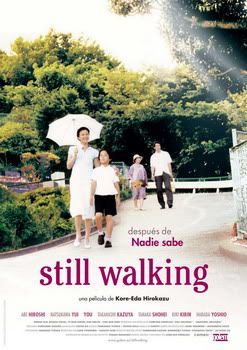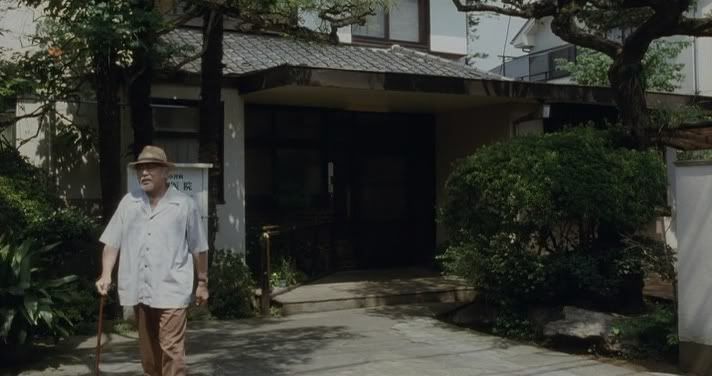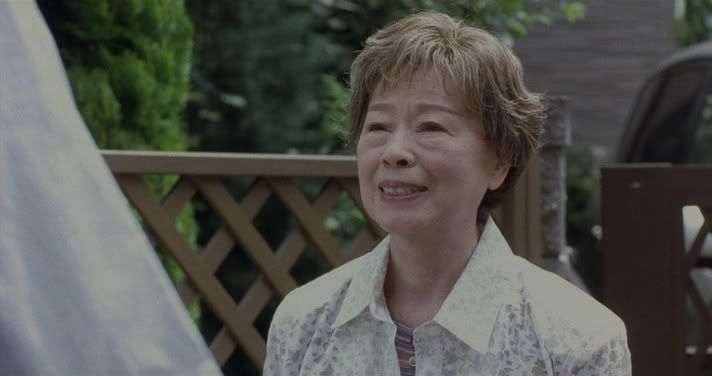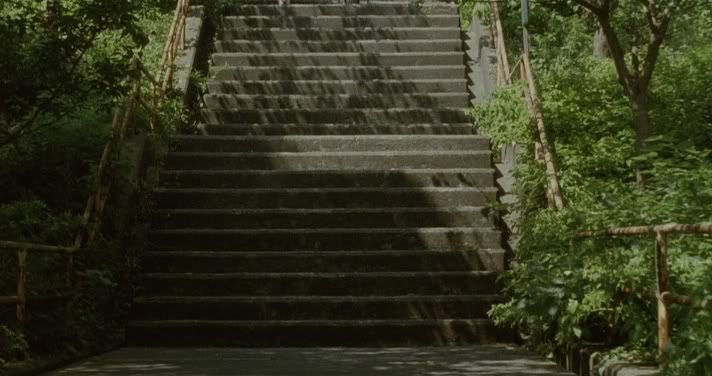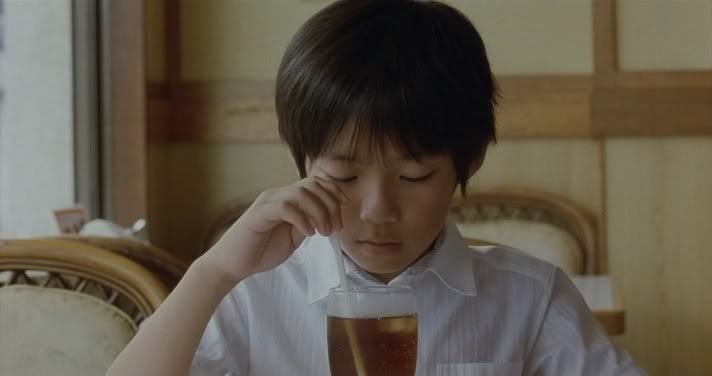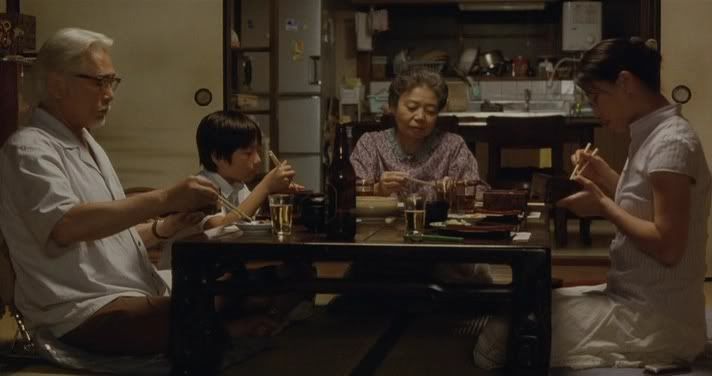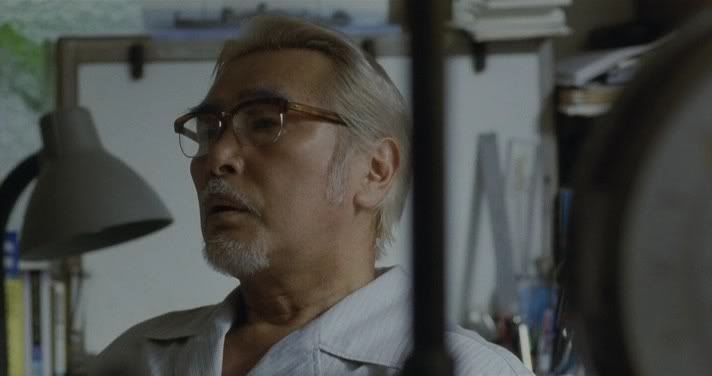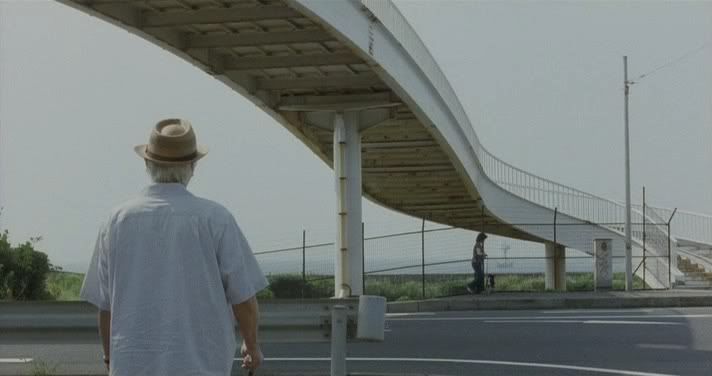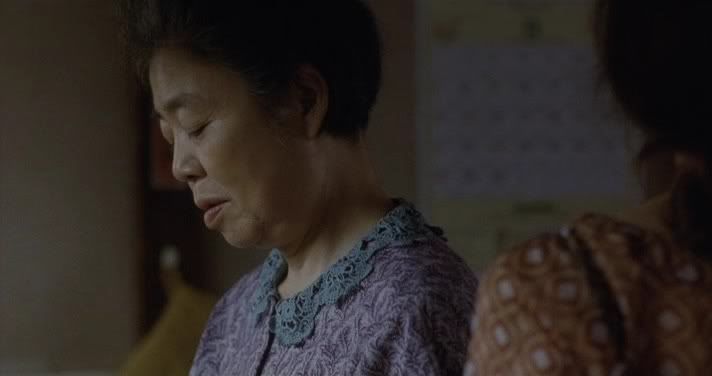
IMDb
filmaffinity
TÍTULO ORIGINAL: Aruitemo, Aruitemo (Even If You Walk and Walk) (Still Walking).
PAÍS: Japón.
DIRECTOR: Hirokazu Koreeda (AKA Hirokazu Kore-eda).
GUIÓN: Hirokazu Koreeda (AKA Hirokazu Kore-eda).
MÚSICA: Gonchichi.
FOTOGRAFÍA: Yutaka Yamasaki.
REPARTO: Abe Hiroshi, Natsukawa Yui, You, Takahashi Kazuya, Kiki Kirin.
PRODUCTORA: TV Man Union.
GÉNERO: Drama.
SINOPSIS: la película presenta un drama familiar y transcurre en un día de verano, en el que unos hijos ya adultos visitan a sus ancianos padres, que han vivido durante décadas en la residencia familiar. El hijo y la hija vuelven, junto con sus respectivas familias, para una reunión inusual, con el fin de conmemorar la trágica muerte del hijo mayor, que falleció en accidente quince años atrás. Aunque el caserón y el menú de la madre apenas hayan cambiado con el paso de los años, se aprecian ligeros cambios en cada miembro de la familia. Se trata de una típica familia, donde reinan el amor, los rencores y los secretos (filmaffinity).
Review:
Screenshots:I was worried when I heard Hirokazu Kore-eda introduce Still Walking.
Silly me.
When Kore-eda said that the film had been prompted in large part in response to the passing of his mother and that it was his favorite and most personal film, I braced myself for a Japanese version of When Was the Last Time You Saw Your Father? I was half expecting a sentimental romp through the grief process that idealized the dead. What unfolded instead over the next two hours was one of the most precise and true depictions of a parent/adult child relationship that I’ve seen on film. Still Walking is a rich, generous, and moving portrait of human relations. It is simultaneously very specific about its cultural setting and universal in its themes. It is two hours spent with a true master of world cinema (Koreeda is crediting with both writing and directing) at the height—and in complete control—of his craft.
One of the things that makes Still Walking so effective is its honesty. While the filmmaker is on the other side of the death of his parent, his surrogate in the film, Ryota (Hiroshi Abe in a performance so self-effacing you don’t realize until days later how splendid it is), is not. The director refuses to foreground the knowledge his characters don’t have in a grab for (relatively) cheap sentiment. Instead, he does something riskier but ultimately more effective. He lets the parents be flawed human beings.
Ryota sees the way his father is aloof and contemptuous (he is disappointed in his son’s lack of professional success); there is an implication (if I read the film correctly) that he cheated on Ryota’s mother. Ryota’s brother drowned when he was an adolescent, and Ryota can neither live up to his parents’ idealized conception of what his brother was (or would become) nor understand their hardened, bitter cruelty towards the (now) man who was saved in the same incident and comes annually to the Yokoyama house to acknowledge his debt. Ryota’s wife complains that the parents do not treat her child (his step-son and their grandson) as a true family member, and she is right.
Yet for all that, the film is also not merely an indictment of the parents. Kore-eda said in his question and answer session that the tone of the film was in large part a response to watching his terminally ill mother in the hospital and his frustrations at the way she could be curt and petty with her visitors and caregivers. In retrospect, he shared, those moments of pettiness became cherished—perhaps because they were the only moments he had. Just about any married couple from any culture will laugh with recognition at the scene in which Ryota and his wife ride away from his parents, already beginning to plan how they can postpone or put off the next visit, cross-cut with the parents discussing how they can get the couple to stay longer next time.
One problem with parent-child relations, as the film aptly illustrates, is that most relationships tend to stagnate absent regular, routine interactions. Ryota complains early in the film that his father thinks he still follows baseball. It is one of those universally identifiable moments expressing the exasperation the young (or middle aged) feel when those who do not share their lives on a daily basis insist on relating to the person they once were rather than the person they are now. Yet when Ryota learns that his father now follows soccer, his own realization that he is not abreast of the changes in their lives cannot foster the sort of curiosity or desire necessary to discover the person his father now is. Instead, we get the perfunctory plans and promises that they should attend a game together—a plan both know is more rhetorical than real.
I realize in looking back over what I’ve written that I make the film sound like more of a melodrama than it really is. One thing that saves the film from being too melodramatic is its concentration. Kore-eda said that his writing strategy was to start with household objects and to imagine the conversations and stories that unfolded around them. As a result of this strategy, the narrative never seems rushed and particular scenes aren’t foregrounds or hurried over in proportion to their relationship to a primary narrative thread. Another result is that even though the running time is under two hours, it feels as full and as detailed as Yi-Yi (which was approximately an hour longer). Each character has his or her moment in the center, but this never feels forced or intentional. The detail comes from the fact that we are invited to attend closely to each moment rather than the fact that we are given a glut of moments to attend to.
When I was discussing the festival with a colleague in Toronto, he asked me if I thought Still Walking could get American distribution and achieve the sort of mainstream, commercial success that comes the way of maybe one or two foreign-language films a year. It was an interesting question. On the one hand, Americans love family dramas, and, thematically at least, Still Walking is a bit more accessible than some of Kore-eda’s other work. On the other hand, earlier in the week I had just observed a theater full of (mostly) North Americans chastise Clare Denis with a litany of petulant “but nothing happened!” complaints about her film.
So let me put a proposition to you. Go to Netflix and put Kore-eda’s 1995 masterpiece Maborosi at the top of your queue. If you think it is an exquisite study of the human soul, full of grand insights about love, loss, grief, healing, and the pains and joys of living as finite creatures in an infinite universe, then I trust you’ll find Still Walking one of the most rewarding viewing experiences of the year.









Código: Seleccionar todo
File Name .............: Even If You Walk and Walk.avi
File Size (in bytes) ..: 1,561,507,840 bytes
Runtime (# of frames) .: 01:54:46 ( frames)
Video Codec ...........: XviD
Frame Size ............: 704x384 [=1.833]
FPS ...................: 23.976
Video Bitrate .........: 1359 kb/s
Bits per Pixel ........: 0.210 bpp
B-VOP, N-VOP, QPel, GMC ......: [B-VOP]...[]...[]...[]
Audio Codec ...........: 0x2000(AC3, Dolby Laboratories, Inc) AC3
Sample Rate ...........: 48000 Hz
Audio bitrate .........: 448 kb/s [2 channel(s)] CBR audio
Interleave ............: 42 ms
No. of audio streams ..: 1Subtítulos en español, traídos por chingados: Opensubtitles.
Thanks to shooky @ ADC for the DVD
FitoCorleone escribió:Still Walking
(Aruitemo, Aruitemo)
------------------------------------------------------------
Ficha Tecnica
Título original: Aruitemo, Aruitemo
Año: 2008
Director: Hirokazu Koreeda
Guión: Hirokazu Koreeda
Genero: Drama
Productora: TV Man Union
Duración: 114 min
País: Japón
Lenguaje: Japones
------------------------------------------------------------
Ficha Artistica
Hiroshi Abe - Ryota Yokoyama
Yui Natsukawa - Yukari Yokoyama
You - Chinami Kataoka
Kazuya Takahashi - Nobuo Kataoka
Shohei Tanaka - Atsushi Yokoyama
Kirin Kiki - Toshiko Yokoyama
Yoshio Harada - Kyohei Yokoyama
Ryôga Hayashi - Mutsu Kataoka
------------------------------------------------------------
Sinopsis
Una historia familiar que transcurre en un solo día acerca de unos hijos adultos que regresan
a casa para visitar a sus ancianos padres.Hace décadas que los padres viven solos en la casa
familiar. Su hijo y su hija regresan después de mucho tiempo para una reunión familiar y traen
a sus hijos. Se reúnen para conmemorar la trágica muerte del hijo mayor, que se ahogó hace
quince años.La casa sigue siendo tan cómoda y espaciosa como antes; la comida que ha
preparado la madre, tan buena como antes, pero todos han cambiado sutilmente.
------------------------------------------------------------
Datos Copia de Seguridad
Nombre: Still.Walking.(2008).DvDrip.(Jap.).(Xvid+Ac3).(proteinicos.es).by.FitoCorleone.avi
Tamaño: 1336 Mb
Duración: 01:49:51 (6591.08 s)
Resolución: 712 x 376
Frame aspect ratio: 89:47 = 1.893617
Bitrate: 1499 kbps
Framerate: 25 fps
Audio track nr. 1: 0x2000 (AC3) Bitrate: 192 kbps CBR Channels: 2 Stream size: 151 Mb
------------------------------------------------------------
Capturas
------------------------------------------------------------
Paginas de interes
filmaffinity - Still Walking
filmaffinity - Hirokazu Koreeda
imdb - Aruitemo, Aruitemo
imdb - Hirokazu Koreeda
golem - Still Walking
------------------------------------------------------------
E-Links
Still.Walking.(2008).DvDrip.(Jap.).(Xvid+Ac3).(proteinicos.es).by.FitoCorleone.avi
Still.Walking.(2008).DvDrip.(Jap.).(Xvid+Ac3).(proteinicos.es).by.FitoCorleone.srt

---------------------------------------------------------------
Web de referencia: www.proteinicos.es
